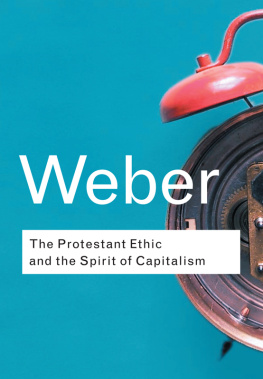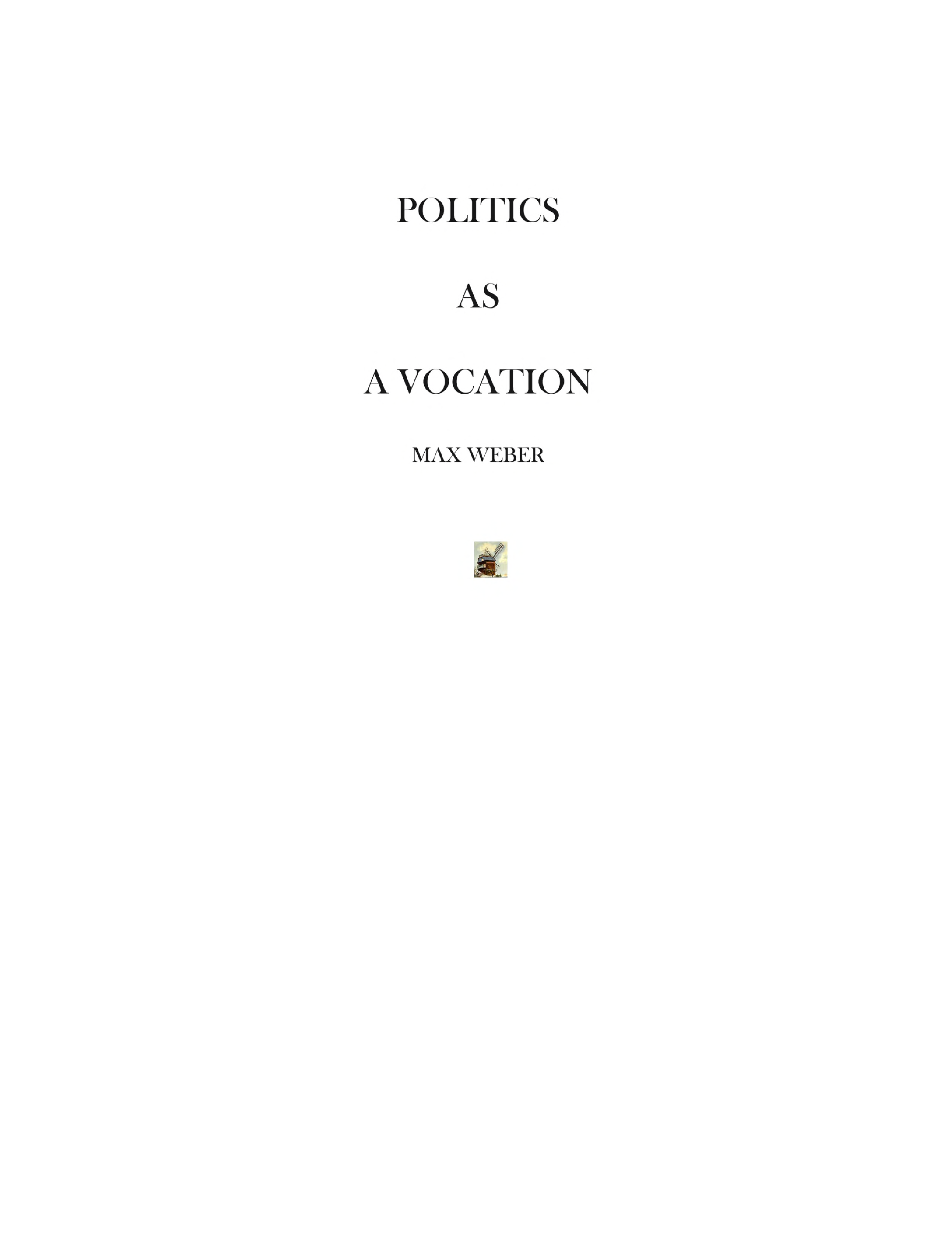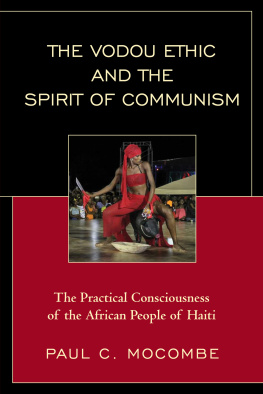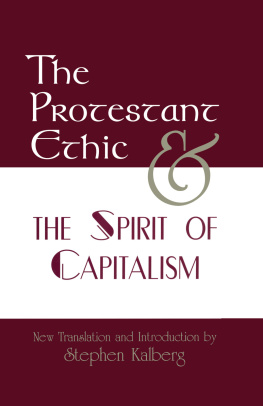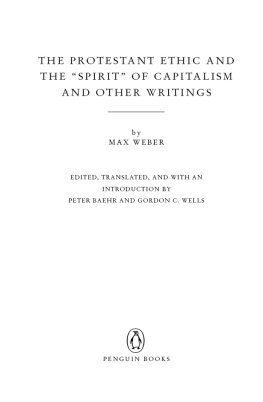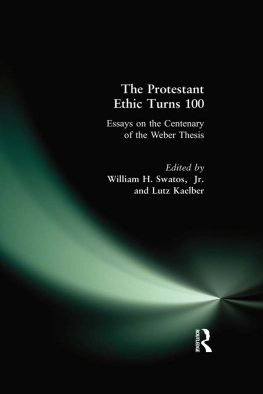Weber - Protestant Ethic and the Spirit of Capitalism
Here you can read online Weber - Protestant Ethic and the Spirit of Capitalism full text of the book (entire story) in english for free. Download pdf and epub, get meaning, cover and reviews about this ebook. publisher: Taylor and Francis, genre: Science. Description of the work, (preface) as well as reviews are available. Best literature library LitArk.com created for fans of good reading and offers a wide selection of genres:
Romance novel
Science fiction
Adventure
Detective
Science
History
Home and family
Prose
Art
Politics
Computer
Non-fiction
Religion
Business
Children
Humor
Choose a favorite category and find really read worthwhile books. Enjoy immersion in the world of imagination, feel the emotions of the characters or learn something new for yourself, make an fascinating discovery.
Protestant Ethic and the Spirit of Capitalism: summary, description and annotation
We offer to read an annotation, description, summary or preface (depends on what the author of the book "Protestant Ethic and the Spirit of Capitalism" wrote himself). If you haven't found the necessary information about the book — write in the comments, we will try to find it.
Protestant Ethic and the Spirit of Capitalism — read online for free the complete book (whole text) full work
Below is the text of the book, divided by pages. System saving the place of the last page read, allows you to conveniently read the book "Protestant Ethic and the Spirit of Capitalism" online for free, without having to search again every time where you left off. Put a bookmark, and you can go to the page where you finished reading at any time.
Font size:
Interval:
Bookmark:
Max Weber is the one undisputed canonical figure in contemporary sociology.
The Times Higher Education Supplement
Weber's essay is certainly one of the most fruitful examinations of the relations between religion and social theory which has appeared, and I desire to acknowledge my indebtedness to it.
R. H. Tawney, Religion and the Rise of Capitalism

Routledge Classics contains the very best of Routledge publishing over the past century or so, books that have, by popular consent, become established as classics in their field. Drawing on a fantastic heritage of innovative writing published by Routledge and its associated imprints, this series makes available in attractive, affordable form some of the most important works of modern times.
For a complete list of titles visit
www.routledgeclassics.com
Max
The Protestant Ethic and
the Spirit of Capitalism
Translated by Talcott Parsons
With an introduction by Anthony Giddens

First published 1930 by Allen and Unwin
First published by Routledge 1992
First published in Routledge Classics 2001
by Routledge
2 Park Square, Milton Park, Abingdon, Oxon 0X14 4RN
711 Third Avenue, New York, NY 10017
Routledge is an imprint of the Taylor & Francis Croup, an informa business
1930 Max Weber
Typeset in Joanna by RefineCatch Limited, Bungay, Suffolk
All rights reserved. No part of this book may be reprinted or reproduced or utilised in any form or by any electronic, mechanical, or other means, now known or hereafter invented, including photocopying and recording, or in any information storage or retrieval system, without permission in writing from the publishers.
British Library Cataloguing in Publication Data
A catalogue record for this book is available from the British Library
Library of Congress Cataloging-in-Publication Data
Weber, Max, 18641920.
[Protestantische Ethik und der Geist des Kapitalismus. English]
The Protestant ethic and the spirit of capitalism/Max Weber; translated by Talcott Parsons; introduction by Anthony Giddens, p. cm. (Routledge classics)
Includes bibliographical references and index.
ISBN 0-415-25559-7 ISBN 0-415-25406-X (pbk.)
1. Capitalism Religious aspects Christianity. 2. Sociology, Christian. 3. Christian ethics. 4. Protestant work ethic. I. Title. II. Series.
BR115.C3 W413 2001
306.6 dc21 2001034800
ISBN10: 0-415-25559-7 (hbk)
ISBN10: 0-415-25406-X (pbk)
ISBN13: 978-0-415-25559-2 (hbk)
ISBN13: 978-0-415-25406-9 (pbk)
BY ANTHONY GIDDENS
The Protestant Ethic and the Spirit of Capitalism undoubtedly ranks as one of the most renowned, and controversial, works of modern social science. First published as a two-part article in 19045, in the Archiv fr Sozialwissenschaft und Sozialpolitik, of which Weber was one of the editors, it immediately provoked a critical debate, in which Weber participated actively, and which, some seventy years later, has still not gone off the boil. This English translation is in fact taken from the revised version of the work, that first appeared in Weber's Gesammelte Aufstze zur Religionssoziologie (Collected Essays on the Sociology of Religion), published in 19201 just after Weber's death, and thus contains comments on the critical literature to which its initial appearance had given rise.
Weber wrote The Protestant Ethic at a pivotal period of his intellectual career, shortly after his recovery from a depressive illness that had incapacitated him from serious academic work for a period of some four years. Prior to his sickness, most of Weber's works, although definitely presaging the themes developed in the later phase of his life, were technical researches in economic history, economics and jurisprudence. They include studies of mediaeval trading law (his doctoral dissertation), the development of Roman land-tenure, and the contemporary socio-economic conditions of rural workers in the eastern part of Germany. These writings took their inspiration in some substantial part from the so-called historical school of economics which, in conscious divergence from British political economy, stressed the need to examine economic life within the context of the historical development of culture as a whole. Weber always remained indebted to this standpoint. But the series of works he began on his return to health, and which preoccupied him for the remainder of his career, concern a range of problems much broader in compass than those covered in the earlier period. The Protestant Ethic was a first fruit of these new endeavours.
An appreciation of what Weber sought to achieve in the book demands at least an elementary grasp of two aspects of the circumstances in which it was produced: the intellectual climate within which he wrote, and the connections between the work itself and the massive programme of study that he set himself in the second phase of his career.
German philosophy, political theory and economics in the nineteenth century were very different from their counterparts in Britain. The dominant position of utilitarianism and classical political economy in the latter country was not reproduced in Germany, where these were held at arm's length by the influence of Idealism and, in the closing decades of the nineteenth century, by the growing impact of Marxism. In Britain, J. S. Mill's System of Logic (1843) unified the natural and social sciences in a framework that fitted comfortably within existing traditions in that country. Mill was Comte's most distinguished British disciple, if sharply critical of some of his excesses. Comte's positivism never found a ready soil in Germany; and Dilthey's sympathetic but critical reception of Mill's version of the moral sciences gave an added impulse to what came to be known as the Geisteswissenschaften (originally coined precisely as a translation of moral sciences). The tradition of the Geisteswissenschaften, or the hermeneutic tradition, stretches back well before Dilthey, and from the middle of the eighteenth century onwards was intertwined with, but also partly set off from, the broader stream of Idealistic philosophy. Those associated with the hermeneutic viewpoint insisted upon the differentiation of the sciences of nature from the study of man. While we can explain natural occurrences in terms of the application of causal laws, human conduct is intrinsically meaningful, and has to be interpreted or understood in a way which has no counterpart in nature. Such an emphasis linked closely with a stress upon the centrality of history in the study of human conduct, in economic action as in other areas, because the cultural values that lend meanings to human life, it was held, are created by specific processes of social development.
Just as he accepted the thesis that history is of focal importance to the social sciences, Weber adopted the idea that the understanding (Verstehen) of meaning is essential to the explication of human action. But he was critical of the notions of intuition, empathy, etc. that were regarded by many others as necessarily tied to the interpretative understanding of conduct. Most important, he rejected the view that recognition of the meaningful character of human conduct entails that causal explanation cannot be undertaken in the social sciences. On the level of abstract method, Weber was not able to work out a satisfactory reconciliation of the diverse threads that he tried to knit together; but his effort at synthesis produced a distinctive style of historical study, combining a sensitivity to diverse cultural meanings with an insistence upon the fundamental causal role of material factors in influencing the course of history.
Font size:
Interval:
Bookmark:
Similar books «Protestant Ethic and the Spirit of Capitalism»
Look at similar books to Protestant Ethic and the Spirit of Capitalism. We have selected literature similar in name and meaning in the hope of providing readers with more options to find new, interesting, not yet read works.
Discussion, reviews of the book Protestant Ethic and the Spirit of Capitalism and just readers' own opinions. Leave your comments, write what you think about the work, its meaning or the main characters. Specify what exactly you liked and what you didn't like, and why you think so.

